With a ‘game-changing’ new act set to come into force soon, companies must be careful to adhere to the rules. But doing so is proving far from easy
Unilever has made a virtue of its sustainability credentials for years. So when the Competition & Markets Authority (CMA) announced last December that it was investigating some of the company’s claims, it raised more than a few eyebrows.
An initial review by the CMA had uncovered “vague” and potentially misleading language used by the consumer goods giant across some of its household brands. Although it confirmed it would co-operate with the investigation, Unilever expressed its “surprise and disappointment” it was being singled out by the regulator.
And it wasn’t alone in its concerns.
After all, if Unilever – both a trailblazer on sustainability in the industry, and one with access to legions of in-house lawyers and technical experts to triple-check every word it utters – could still be falling foul of the rules, then what hope did everyone else have?
It showed that, three years after it was first introduced, the Green Claims Code (GCC) continues to trip up not only the most well-intentioned but the most well-resourced brands.
So, where does the confusion lie? And how can industry players safely navigate the GCC to avoid finding themselves next in the firing line?
Introduced in September 2021, as the CMA began to sharpen its focus on greenwashing, the GCC is intended as a guide for companies making any claim on the environmental credentials of its product or service. Though the code doesn’t have legislative footing itself, it’s used as a framework to decide whether or not any such claim breaches consumer protection laws that prohibit consumers from being misled. Crucially, any such breach could see offending companies face more than an embarrassing visit to court. Later this year, the Digital Markets, Competition & Consumers (DMCC) Act is expected to come into force, granting the CMA the ability to dish out fines of up to 10% of global turnover. “The DMCC Act is a game-changer,” says Duncan Reed, partner at UK law firm TLT, which will force even the most laissez-faire brand or retailer to get to grips with what’s allowed.
The code’s six core principles
At first glance, doing so seems relatively straightforward. According to the GCC, any environmental claim must align with six core principles: they must be truthful and accurate; clear and unambiguous; not omit or hide important relevant information; make fair and meaningful comparisons; consider the full lifecycle of a product; and be substantiated.
So far, so straightforward? It seems not. In fact, according to the CMA’s own research in August 2023, 40% of green claims could be construed as misleading currently. And more than half (62%) of British shoppers are left unsure which brands are sustainable and which aren’t. Some of these breaches will be by companies with unscrupulous practices, of course. But a lot of the time, companies simply don’t understand where they’re going wrong, points out Alison Puente, founder of Mason & Sutter, a consultancy specialising in sustainability strategy and insight.
“Companies tell us they’re facing significant challenges in understanding and applying the details of the GCC,” she says. “Up until now, most have failed to pay much attention to its full set of principles, possibly not understanding its relevance or the penalties they might face if they don’t comply. [But] there’s now far more focus on environmental credentials of products, both in terms of brand claims and associated scrutiny.”
Currently, there’s a few common stumbling blocks, according to Puente. One is not understanding the code’s scope. For example, the risk isn’t only in making a de facto misleading or inaccurate claim. Companies also need to avoid “promoting positive environmental performance while downplaying or hiding negatives, vague or overly broad claims, lack of supporting evidence and data, and even inconsistencies between different areas of the business or across a product’s lifecycle”. Imagery can even be taken into account, with or without wording alongside. One area in which Unilever faces questions, for example, is whether its colour palette and use of images, such as green leaves, could create the impression some products are more environmentally friendly than they are.
“The days when exaggeration was considered an acceptable practice in advertising are over”
Ron Moscana, partner at Dorsey & Whitney
Some of the language used in the code is also “potentially ambiguous”, she adds, leaving companies at risk of misinterpretation. Take the requirement that comparisons be “clear and meaningful”. “While the CMA has provided significant guidance to help companies navigate this, many are extremely concerned they may inadvertently fall foul of the code – for example, by being unaware of an issue elsewhere in the business that could contradict a brand claim,” she says.
Third, a lack of technical knowhow at some brands and retailers leads to challenges on the misuse of certain claims. This goes for descriptors like “fully recyclable”, for example, which has a complex definition that goes far beyond its colloquial use. “A product may be made from fully recycled materials, but if this product cannot then be easily recycled at end of life, then any environmental claims need to be made with caution,” says Puente.
Fashion retailers in the firing line
It isn’t only grocery coming a cropper as a result, of course. In July 2022, the CMA announced it was investigating Asda, Asos and Boohoo amid concerns that their claims around sustainable fashion collections, such as Asda’s ‘George for Good’ range, were giving a false impression of their eco-credentials. Questions were asked of overly broad statements, criteria used for claims like ‘recycled fabrics’ and whether or not consumers were supplied with enough additional information. And though no formal breaches were found, in March all three retailers publicly signed undertakings to use only “accurate and clear” green claims.
As the first major investigation by the regulator, the finer details contained in those agreements – as well as an open letter to the UK fashion sector by the CMA the same month – provides a good starting point for fmcg brands and retailers looking to brush up on the GCC.
“The undertakings specify any information key to the understanding of green claims must be clear and prominent, and retailers should avoid ambiguous terms like ‘eco’, ‘responsible’ or ‘sustainable’ to describe product ranges without further explanation,” says Reed. “Any claims made to customers about environmental targets must [also] be supported by a clear and verifiable strategy and details of what the target is aiming to achieve, the date by which it’s expected to be met and how that target will be achieved.”
It’s as much about a cultural or mindset shift as it is wading through pages and pages of legalese, though. What’s critical is that “consideration of the code should be baked into advertising conversations, and there should be ‘conscious compliance’ from day one of a campaign”, suggests Oz Watson, senior associate from Taylor Wessing’s IP team.
Not restricting this conversation to marketing teams and making use of technical expertise elsewhere in the business to ensure the veracity of claims is also crucial. “Remember, this applies to a variety of departments – from packaging design to customer service,” says Puente. “Consider a toolkit along with training to make compliance as easy as possible.”
Once an environmental claim has been agreed, “the devil is in the detail”, points out Reed. Steps must be taken to ensure all representations are truthful and accurate. Specifically, is there credible evidence? Is there reliable scientific data that can be shared? Next, the language used within those claims should be clear and unambiguous, avoiding technical jargon or overly broad, vague claims that could confuse or mislead. Plus, the full lifecycle of the product or service must be considered – does the claim still apply? Is there a conflict elsewhere in the value chain?
“Consideration of the code should be baked into advertising conversations, and there should be ‘conscious compliance’ from day one”
Oz Watson, senior associate at Taylor Wessing
For smaller brands, the cost and resources required to meet these requirements may mean restricting to a couple of core claims to ensure accuracy. That was When in Rome’s approach as it rolled out its paper wine bottle in 2022, with the team opting to drill down on proving the significantly smaller carbon footprint of the packaging versus a traditional glass bottle. “Accuracy and clarity are absolutely essential – it’s why we focus on one metric only and obsess over it: our climate impact,” says founder and CEO Rob Malin. “We’re often accused of ‘carbon tunnel vision’ and that’s a fair point – but as a small challenger brand we don’t have the capacity to monitor our performance against 30 KPIs.”
Businesses shouldn’t be afraid to share their workings, either. When Abel & Cole launched its Grocer Gold-winning Club Zero refillable milk carton last year, it published in-depth insight into its calculations on potential carbon savings via a dedicated landing page, using ReLondon’s carbon calculator in the development stages too, explains head of marketing Georgina Holland. “This data was the foundation of our campaign comms,” she says.
“Our biggest piece of advice would be to hold evidence before you make claims, rather than gathering evidence after the fact,” adds Holland. “Whenever we can, we work with independent experts to validate our efforts. For example, our claim that our fruit & veg boxes have on average 77% less plastic compared to four major supermarkets has been verified three times in studies by the campaign group Everyday Plastic.”
Tread carefully here, though, warns Ron Moscona, partner at Dorsey & Whitney. “Reliance on a third-party certification can also be misleading and can be criticised by the CMA and the ASA. If claiming third-party verification or certification, it’s important to explain what expertise and credentials the third-party certifying body has and if it’s truly independent.”
Whatever brands do, they should not embellish. “The days when exaggeration was considered acceptable in advertising are over,” adds Moscona. “It’s not enough that a claim can be ‘technically’ true.”
Daunting as it all seems, now’s the time to get stuck in. Not only are the CMA and Advertising Standards Authority expected to step up their hunt for UK companies breaking the rules once the DMCC is fully in force, similar clampdowns are emerging elsewhere in Europe, too. In January, the European Parliament adopted a proposal for a new directive that would ban misleading ‘green’ advertising and ensure consumers are provided with more robust information on claims. The regulation would ban the use of general environmental claims like ‘environmentally friendly’, ‘natural’, ‘biodegradable’ or ‘eco’ without proof.
“It’s crucial that companies get to grips with this now – it’s relatively complex and increasingly a focus area of regulators,” says Watson. “When the DMCC is fully in force, we expect to see the CMA take a proactive approach to enforcement, and non-compliant companies will be in the firing line for fines.”
In other words, soon there will be no hiding place – or excuses – for companies falling foul of the rules.
Eco-initiatives worth shouting about in UK grocery
At The Grocer Gold Awards earlier this month, seven initiatives (out of 35) were shortlisted in the Sustainability Initiative of the Year category. Here’s why
Winner: Abel & Cole: Refillable milk bottle
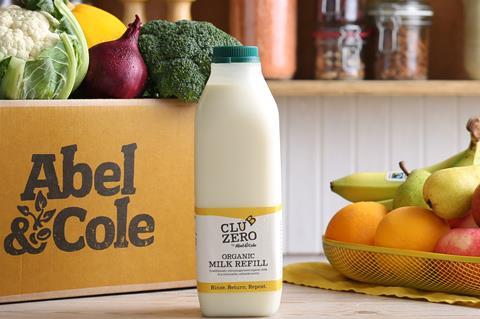
Abel & Cole won the Grocer Gold Award for Sustainable Initiative of the Year for its reusable, eco-friendly and refillable plastic milk bottle. The UK-first is the latest addition to its Club Zero refillables range. The one-litre PP bottle can be reused up to 16 times by customers and has the potential to cut out 23 tonnes of plastic as take-up grows, says the direct to consumer delivery service.
Finalists:
-
Arla Foods: Incentivising sustainable farming

Launched in October 2023, Arla’s Customer Sustainability Programme is an innovative funding model that allows its network of farmer owners to accelerate their progress on sustainability by allowing retail customers to invest – while also using the results to reduce their own Scope 3 emissions. It has already secured 1.1 billion-plus litres of milk on to the programme.
-
Central Co-op: Large-scale solar rollout
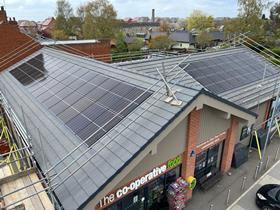
Central Co-op kicked off an ambitious green energy self-sufficiency initiative in 2023 that will see it install solar panels across all 185 of its retail and funeral locations. As well as helping the retailer drive down emissions as part of its Carbon Neutral strategy, it estimates that the installation of solar technology could see it make savings of up to £2.6m each year across 182 sites.
-
DDRS Alliance: Boosting Brecon’s recycling
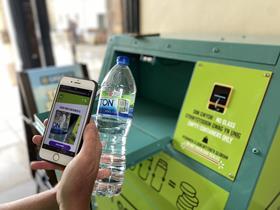
The DDRS Alliance – a collective of soft drink and alcohol brands, retailers and waste management providers – sought to prove that a digital DRS model was the most effective option for boosting recycling rates via a 16-week trial in Brecon, Wales. The trial was a resounding success, with nearly 19,000 containers returned by 1,500 users and strong engagement across stakeholders.
-
Dentek: Reimagining the dental category
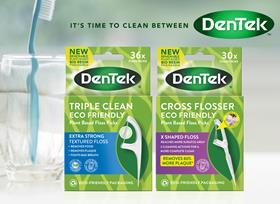
Dentek sought to disrupt the dental category, which is dominated by floss picks and brushes made of plastic. Its eco-friendly range, which rolled out in retail in 2023, is made from a plant-based bioresin derived from sugar cane, which allows items to be reused multiple times and absorbs more CO2 than it produces, says the brand, cutting emissions by up to 80% versus traditional plastics.
-
Greenvale Disease-resistant potato crops

PCN (potato cyst nematode) is one of the biggest threats to UK potato crops. Greenvale has invested heavily in alternatives, and 2023 marked the year that one of the ‘fruits’ of that labour reached supermarket shelves, with its Karelia variety transitioned to commercial availability – a variety that has been shown to reduce the PCN count in soil by up to 80%.
-
When in Rome: ‘world-first’ paper wine bottle
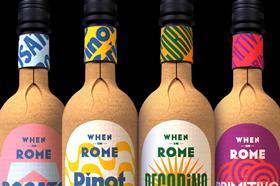
When in Rome’s paper bottle – a world-first in the category, according to the brand – is made from 94% recycled paperboard and with a carbon footprint up to six times lower than a single-use glass bottle. The packaging innovation launched into Sainsbury’s in 2023, a major listing that helped it to sell 20,000 cases in total and deliver carbon avoidance of 160 tonnes compared with the glass equivalent.







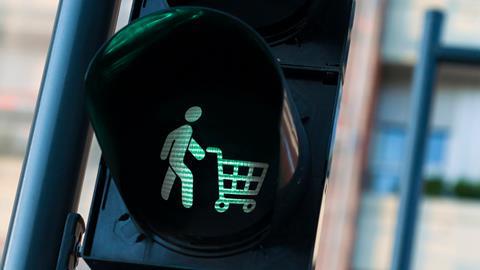
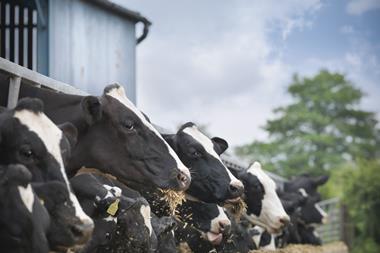











No comments yet